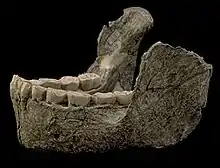Peninj Mandible
The Peninj Mandible(Peninj 1), also called Natron mandible,[1] is the fossilized lower jaw and teeth of an australopithecine specimen, likely that of Australopithecus boisei[2] or a similar population.[3] It was discovered in West Lake Natron,[4] in Ngorongoro District of Arusha Region of Tanzania by Kamoya Kimeu,[5][6] Glynn Isaac, and Richard Leakey in 1964.[7]
 | |
| Catalog no. | Peninj 1 |
|---|---|
| Common name | Peninj Mandible |
| Species | Australopithecus boisei |
| Age | 1.5 mya |
| Place discovered | Peninj, Tanzania |
| Date discovered | 1964 |
| Discovered by | Kamoya Kimeu, Richard Leakey |
This mandible (jaw) is estimated to be 1.5 million years old[2] and it is characterized as having a robust build with large molars and reduced incisors.[8] The specimen is believed to be an adult male.[9]
Discovery
Peninj 1 was found in 1964 at a site in Tanzania called Peninj, west of Lake Natron and about 80 km (50 miles) from Olduvai Gorge, a major paleoanthropological site.[10] On the 11th of January, fossil hunter Kamoya Kimeu was crossing the western side of Lake Natron as part of a team led by Richard Leakey when he discovered the mandible buried in ancient volcanic ash in situ.[11] Later that year, Louis Leakey, his wife Mary Leakey and their son Richard, announced the discovery of the Peninj Mandible in an article published in Nature.[12]
Together with the OH 5 cranium, the nearly complete mandible of Peninj 1 showed that this East African species was even more robust than other hominin specimens found in southern Africa.[13]
See also
References
- "Peninj mandible | fossil". Encyclopedia Britannica. Retrieved 2020-05-14.
- "Paranthropus boisei: Peninj 1". eFossils. Retrieved 21 December 2014.
- Schaffer, William M. (1968-11-01). "Character Displacement and the Evolution of the Hominidae". The American Naturalist. 102 (928): 559–571. doi:10.1086/282568. ISSN 0003-0147. S2CID 84461082.
- Torre, Ignacio de la; Mora, Rafael; Martínez-Moreno, Jorge (2008-06-01). "The early Acheulean in Peninj (Lake Natron, Tanzania)". Journal of Anthropological Archaeology. 27 (2): 244–264. doi:10.1016/j.jaa.2007.12.001. ISSN 0278-4165.
- Journal of Eastern African Research and Development. East African Literature Bureau. 1974. p. 129.
The mandible was discovered by Kamoya Kimeu in 1964, during an expedition conducted by Richard Leakey and Glynn Isaac.
- Virginia Morell (11 January 2011). Ancestral Passions: The Leakey Family and the Quest for Humankind's Beginnings. Simon and Schuster. p. 303. ISBN 978-1-4391-4387-2.
- "Paranthropus boisei: Peninj 1 | eFossils Resources". www.efossils.org. Retrieved 2020-05-19.
- "Peninj mandible | fossil". Encyclopedia Britannica. Retrieved 2020-05-14.
- "Paranthropus boisei: Peninj 1 | eFossils Resources". www.efossils.org. Retrieved 2020-05-14.
- "Peninj mandible | fossil". Encyclopedia Britannica. Retrieved 2020-05-14.
- Leakey, L. S. B.; Leakey, M. D. (April 1964). "Recent Discoveries of Fossil Hominids in Tanganyika : At Olduvai and Near Lake Natron". Nature. 202 (4927): 5–7. Bibcode:1964Natur.202....5L. doi:10.1038/202005a0. ISSN 1476-4687. PMID 14166721. S2CID 4162123.
- Leakey, L. S. B.; Leakey, M. D. (April 1964). "Recent Discoveries of Fossil Hominids in Tanganyika : At Olduvai and Near Lake Natron". Nature. 202 (4927): 5–7. Bibcode:1964Natur.202....5L. doi:10.1038/202005a0. ISSN 0028-0836. PMID 14166721. S2CID 4162123.
- Leakey, L. S. B.; Leakey, M. D. (April 1964). "Recent Discoveries of Fossil Hominids in Tanganyika : At Olduvai and Near Lake Natron". Nature. 202 (4927): 5–7. Bibcode:1964Natur.202....5L. doi:10.1038/202005a0. ISSN 0028-0836. PMID 14166721. S2CID 4162123.